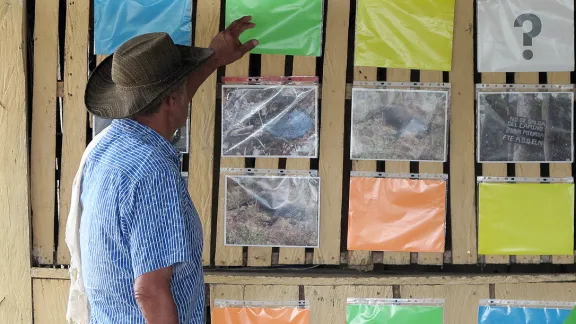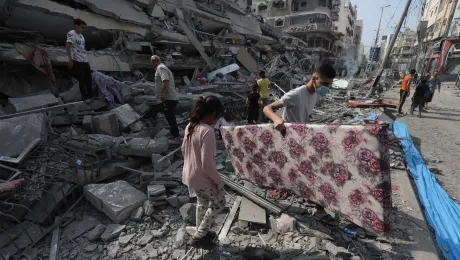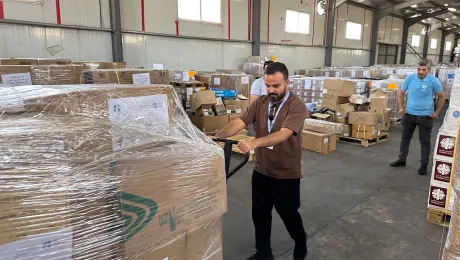
A member of the Caracoles community in the department of Arauca learning how to avoid landmine accidents. Workshop, March 2011. © LWF/DWS Colombia/M. Sjögren
LWF supports victims’ demand for legal rights
(LWI) - Lightning has struck Kevin twice in his short life.
The 25-year-old Colombian has twice been on the receiving end of something all too common and lethal in his South American homeland - landmines.
When he was 13, Kevin was happily playing outside when a land mine exploded, injuring his leg. He still walks with a limp. When he was 17, he picked up an object that turned out to be a landmine. It ripped away both his arms.
Colombia is the world’s second most heavily mined country, following 50 years of fighting between the government and the Revolutionary Armed Forces of Colombia (FARC) guerrillas. Since 1990, landmines have wounded or killed about 11,000 people. The number is likely to be higher as families fear informing authorities lest they be marked as terrorists or supporters.
Victims include more than 1000 children serving with the guerrillas and the military, groups that have mined unpaved roads, river valleys and football fields. Almost all incidents occur in rural areas and most survivors are left permanently disabled. Although according to the Ottawa Treaty, the Colombian military has stopped using landmines, the impact of explosive remnants of war is still a concern. It implies the state is still responsible for left over bullets, grenades and mines.
Many of the families of the victims of Colombia's landmine explosions are internally displaced people who have lost their main breadwinners - the men. Women have to support their families, often supplemented by allowances and health care services.
In addition, many male victims have psychological problems. They are frustrated, and lack self-respect and the desire to change their lives because of their injuries. The state has not arranged the kind of support and assistance they need.
Skills to improve quality of life
Staff from the Lutheran World Federation and the Finnish Evangelical Lutheran Mission recently visited the department Kevin lives, Arauca, which is Colombia’s fourth most heavily mined region. Driving from the Arauca capital to the municipality of Tame, heavily armed soldiers stop the car several times to ask about the presence and activities in the field of LWF and FELM staff.
Along the way, schoolchildren march along the road while soldiers armed with machine guns watch. This is not an unusual scene in Colombia.
At the association of landmine survivors, many members are missing limbs and some have internal injuries, as well. One young woman, who has lost both arms, is pregnant. They talk about their futile struggle with government bureaucracy as they try to get support.
But it is clear there is some hope for those here at the Association of Landmine Survivors Fighting for Dignity and Peace, the first such body of survivors in Arauca. ASODIGPAZ has some 100 members and is supported by the LWF. Members learn how to demand their legal rights and improve their quality of life.
Survivors and their families gain the skills to help improve their means of livelihood, become entrepreneurs, and learn how to raise small livestock. The project also aims to prevent new landmine incidents by increasing public awareness through training.
The project is necessary because landmine victims are left alone to fight for their rights with the authorities. Victims are labeled guerrillas. Organizations that support them are labelled, in turn, as being supporters of guerrillas. And so authorities refuse to help.
ASODIGPAZ has made training a priority with a number of small projects planned for the start of 2016. They also work to train authorities as well as other citizens about the challengings facing disabled people, in order to make life a little easier for those who have lost limbs. They are petitioning local authorities to build a rehabilitation centre that guarantees proper treatment and prosthesis.
De-mining: a gesture of peace
Negotiations between the Colombian government and FARC guerrillas have been taking place in Havana, Cuba. As a peace gesture, the parties have agreed to start de-mining. While this is largely good news, it is not so for Kevin. Arauca is not one of the departments prioritised, because of the presence of other armed groups and concerns about protecting communities.
The task ahead is a staggeringly difficult one as the landmines have been planted there for almost 50 years. The terrains is very difficult and it is not clear exactly where the landmines are located. Frequent flooding in the area has carried some landmines to different locations.
For his part, Kevin has acquired a hook for one of his arms through the public health care system but it is uncomfortable and he dreams of one day getting a proper prosthesis.
He will travel to Finland in the autumn at the invitation of the church there to help others to think about how to alleviate the suffering caused by landmine accidents, which have wounded so many people and changed their lives.
Kevin will help focus on how to now change their lives again—for the better.
From an article originally published in the magazine of the Finnish Evangelical Lutheran Mission, FELM.


